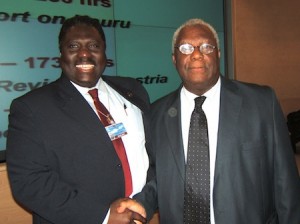 Br Barry Noel pictured with the Permanent Representative of Saint Lucia to the UN in New York, Dr. Donatus (Keith) St. Aimee.
Br Barry Noel pictured with the Permanent Representative of Saint Lucia to the UN in New York, Dr. Donatus (Keith) St. Aimee.
The Universal Periodic Review of Saint Lucia took place in Geneva on Jan 25th. Drawing on the knowledge and experience of those involved with the Presentation Brothers ministry in Saint Lucia, ERI made a recommendation relating to the educational needs of marginalised youth. It was then decided to invite Br Barry Noel fpm to Geneva to assist with the lobbying prior to the actual review.
Although currently based in Ireland, Barry is a native of the Caribbean island of Grenada and more importantly was one of the founders of the Centre for Adolescent Renewal and Education (CARE) which offers training programs for marginalised youth in Saint Lucia. Some of Barry’s reflections on his involvement in the UPR are given below.
“The UPR is a wonderful tool that seeks to hold member states to account on their human rights obligations before the international community. It is a co-operative process which reviews the human rights records of every country, and which reminds States of their responsibility to fully respect and implement all human rights and fundamental freedoms.
The ultimate aim of the mechanism is to improve the human rights situation in all countries and address human rights violations wherever they occur. Thus every country regardless of size, influence, power or economic status, is held accountable at the same level. This offers a sense of hope to grassroots organisations like CARE which continue to work to improve the lot of those who are disadvantaged and marginalised, but who may find it difficult to bring about change at policy level locally that will allow a more permanent improvement to the lives of the poor. Brothers and lay people on the ground should be aware of this effective platform for voicing their concerns around justice and human rights.
The strategy of physically bringing someone from the ‘grassroots’ to be present and to engage with the lobbying process seems to have been particularly effective. There was great interest from the delegations with whom we met in hearing the real stories from someone with direct experience of the local situation. Four out of the six delegations who were approached subsequently put forward our recommendation during the UPR session.
The success of this effort by ERI and CARE can only be measured in the long-term. Now the detailed work of following-up begins – a task for CARE on the local scene.”